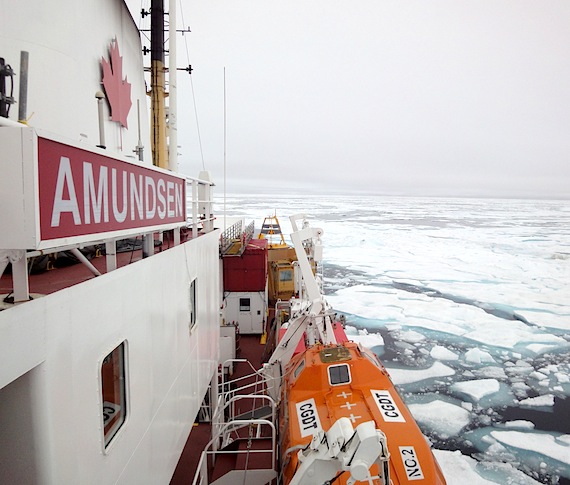Canadian Coast Guard science vessel drops Arctic research plans to help search-and-rescue efforts
The Canadian Coast Guard’s research icebreaker, the Amundsen, shed its research agenda this week and reverted to its original role as an icebreaker.
With 40 scientists on board Amundsen, the icebreaker diverted from its course last week to assist in search and rescue operations and help ferries and fishing boats navigate the ice-clogged waters of the Strait of Belle Isle, off Newfoundland.

Before the decision was made to cancel the science plan, some of the scientists on board the Amundsen had tweeted that they had scuttled their research activities — with no complaint — as the attention of the icebreaker turned to other activities.
But on June 12 the science team of the Amundsen finally cancelled the first leg of its 2017 research plan “due to complications associated with the southward motion of hazardous Arctic sea ice.”
“Large Canadian Arctic climate change study cancelled due to climate change,” read the headline on a joint news release issued by the Amundsen, Arctic Net—the research consortium that oversees research on board the Amundsen—and the University of Manitoba.
“Unfortunately, the conditions required much more extended support than anticipated. Fleet management issues and inadequate alternative ships forced the cancellation of the science program due to significant safety concerns,” said the release.
The timing of the Qanuilirpitaa? (How are we now?) Nunavik Inuit Health Survey, scheduled for Aug. 17 to Oct. 6, from the Amundsen, is not expected to be affected.
But the cancellation postpones the $17-million, four-year Hudson Bay System Study, led by the University of Manitoba, because dealing with the extreme ice conditions meant the ship would arrive too late in Hudson Bay for scientists to complete their research.
“A second week of delay meant our research objectives just could not be safely achieved—the challenge for us all was that the marine ice hazards were exceedingly difficult for the maritime industry, the CCG, and science,” said chief scientist, David Barber, in the release.
Barber said a “significant proportion” of the sea ice came from the High Arctic, adding that climate change means ice is more liable to break off and travel.
“Climate-related changes in Arctic sea ice not only reduce its extent and thickness but also increase its mobility meaning that ice conditions are likely to become more variable and severe conditions such as these will occur more often,” he said.